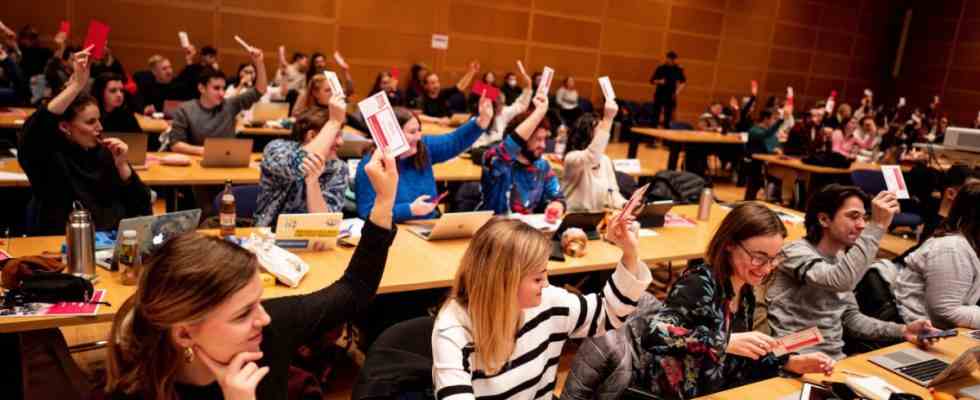Before the CDU and SPD began negotiations on a possible black-red coalition last Thursday, unfamiliar words could be heard from CDU top candidate Kai Wegner: “It’s not about what a first name is,” wrote what may be the next governing mayor of Berlin: ” Mehmet belongs to Berlin just like Michael.” Mind you, the same Kai Wegner whose regional association asked the first names of the German suspects after the riots on New Year’s Eve in Neukölln to find out whether they were Arabic names. And who in 2019 still referred to sea rescuers as “smugglers” and their relief efforts as “taxi services”. Or in 2017 called for a quota for women when refugees entered the country.
Critics accused Wegner and the Christian Democrats of fishing for right-wing votes. An impression that the CDU apparently wanted to quickly refute after the election. The Berlin CDU General Secretary Stefan Evers tweeted At the beginning of March, for example, that according to post-election surveys, the CDU was also ahead among voters with a migration background. The polling institutes Infratest Dimap and Forschungsgruppe Wahlen, which conducted post-election surveys in Berlin, can do this at the request of the Süddeutsche Zeitung however not confirm. No data on migration history was collected. The office of the state returning officer also says: no query of data on migration history. It is true, however, that the majority of Berlin Muslims eligible to vote voted for the CDU, according to a post-election survey by the Wahlen Research Group.
The CDU is also gaining ground in migrant districts
When asked by the SZ, the head of the opinion research institute, Matthias Jung, pointed out that this was a comparatively small survey group: Of the 17,002 randomly selected voters, only 286 had named Muslim as a religion. Although most of them (28 percent) said they had voted for the CDU, the “left camp” was clearly in the majority with 25 percent for the SPD, 15 percent for the left and 8 percent for the Greens among Muslims . In addition, in comparison with other denomination groups, it can justifiably be said that the CDU achieved its worst results among non-denominational and Muslims.
But: The CDU also made gains in migrant districts such as Mitte, Neukölln and Friedrichshain-Kreuzberg, including in the election to the district council, for which EU foreigners were also entitled to vote. In Neukölln of all places, the CDU became the strongest force, apparently not despite but because of Wegner’s statements after New Year’s Eve. The SPD says that during the election campaign it was observed that many people with a migration background felt picked up by the CDU’s law and order approach. You yourself have lost the votes of more conservative people with a migration background to the Union.
Nevertheless, it had become “very loud” in the soundings, especially on this point, according to the Berlin SPD party executive. “The campaign was racist, it also affected me personally,” said Deputy State Chairman Cansel Kiziltepe at the Jusos state delegate conference . The SPD have made demands that must be met. In the black and red exploratory paper, the SPD and CDU announced that they wanted to fight discrimination, right-wing extremism and racism. Details should be negotiated in the “City of Diversity” working group, which will meet for the first time on Wednesday.
Two SPD local branches have already voted against a coalition with the CDU
Although the SPD was already negotiating in a similar working group in the 2021 election, at that time still with the Greens and the Left, what is new is that co-boss Raed Saleh has declared the AG to be a top priority on the part of the Social Democrats. And Franziska Giffey also raised the issue before the start of the coalition talks in an interview with the SZ: “The first name debate after the riots on New Year’s Eve was unspeakable and must never happen again.”
The commitment to the “City of Diversity” is also important for the CDU in Berlin in order to be able to form a coalition with the SPD. In the party left in particular, a growing group of members are trying to prevent a coalition with the Christian Democrats. Two local associations have already voted against a coalition with the CDU, and the Berlin Jusos launched a broad-based “No GroKo” campaign at the weekend. At the state delegates’ conference of the youth organization, the atmosphere in the packed Hans-Jochen-Vogel-Saal in the Willy-Brandt-Haus was accusatory. The chair of the youth association, Taşan-Funke, spoke to a “coalition with reactionaries”, her co-chair Peter Maass of a “dishonorable CDU”, some members called the CDU election campaign “racist”.
SPD negotiating circles say that the Christian Democrats are very aware that the SPD has the most reservations about migration and integration policy, but also about queer issues and questions of equality. The SPD wants its members to vote on the coalition agreement between April 8th and 21st. A positive result is also important for the Christian Democrats.

